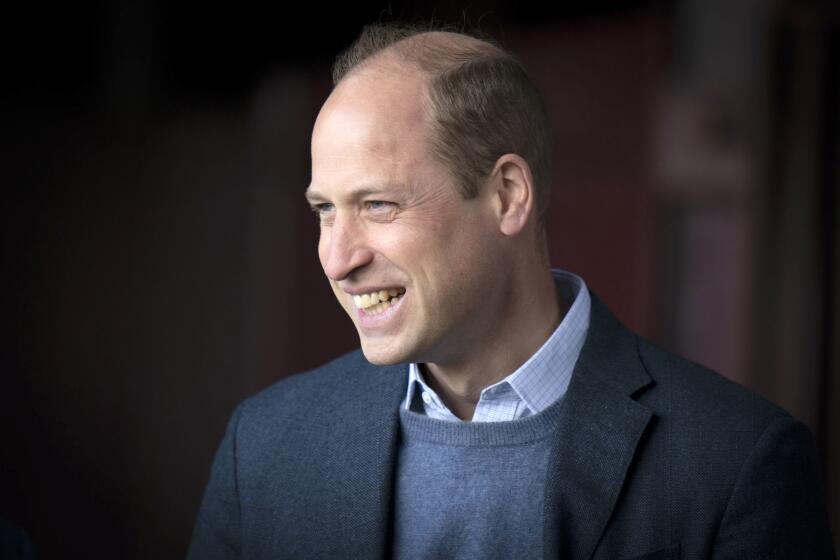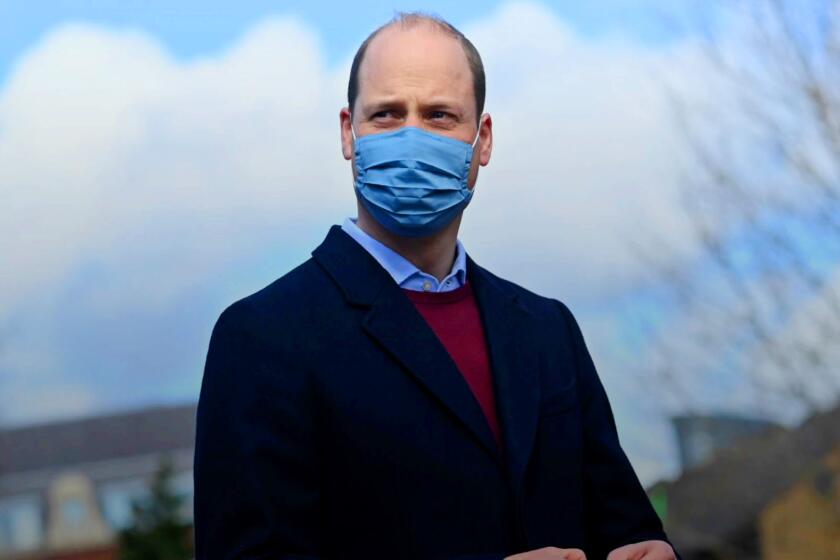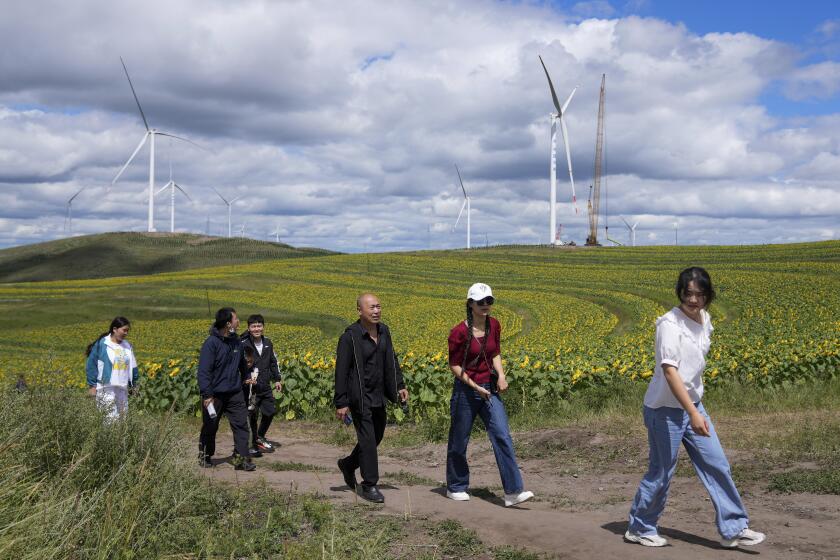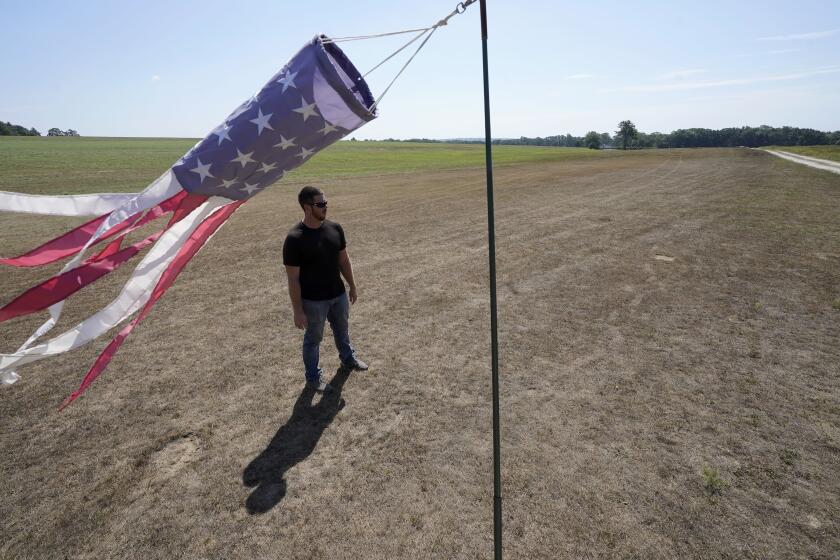Prince William’s conservation charity invests in bank that’s one of world’s biggest backers of fossil fuels
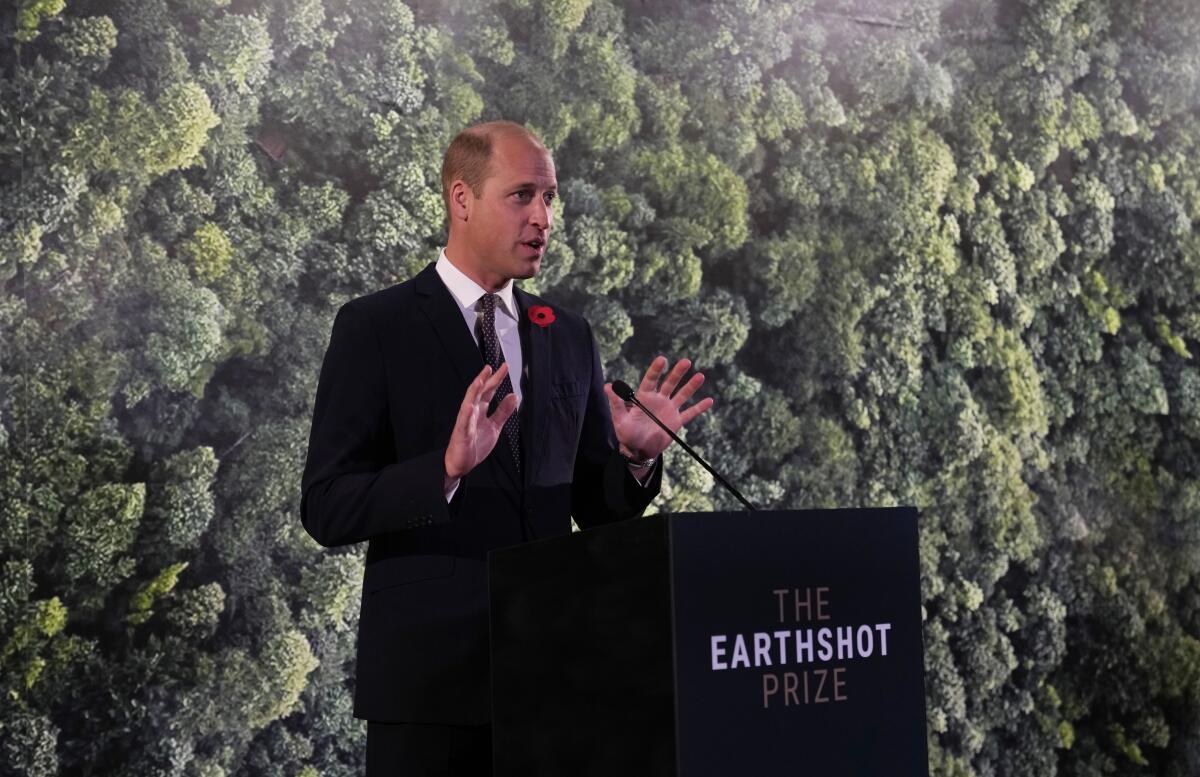
- Share via
LONDON — The conservation charity founded by Prince William, the second in line to the British throne and creator of the environmental Earthshot Prize, keeps its investments in a bank that is one of the world’s biggest backers of fossil fuels, the Associated Press has learned.
The Royal Foundation also places more than half of its investments in a fund advertised as green that owns shares in large food companies that buy palm oil from companies linked to deforestation.
“The earth is at a tipping point and we face a stark choice,” the prince, who nurtures an environmentalist image, is quoted as saying on the websites of the Earthshot Prize and Royal Foundation.
Yet in 2021, his charity kept more than $1.3 million with JPMorgan Chase, according to the most recent filings, and still invests with the corporation today. The foundation also held $2 million in a fund run by British firm Cazenove Capital Management, according to the 2021 filing. As with JPMorgan, it still keeps funds with Cazenove, which in May had securities linked to deforestation through their use of palm oil.
The foundation invested similar amounts in both funds in 2020, its older filings show. As of December 2021, the charity also held more than $12.1 million in cash.
The investments, which the Royal Foundation didn’t dispute when contacted by the AP, come as top scientists repeatedly warn that the world must shift away from fossil fuels to sharply reduce emissions and avoid more and increasingly intense extreme weather events.
The world has watched William from his school days to his life as a family man. Today he assumes an increasingly central role as a royal.
Financial experts say investments like those of the foundation can be blind spots for charities and philanthropies. As climate change is an increasing area of attention for foundations and others, organizations have sometimes struggled to recognize where their own investments lie and align them with more environmentally friendly choices, despite growing numbers of ways to steer clear of funds linked to fossil fuels.
Like the Royal Foundation, in recent years other foundations, including high-profile British charities like the National Trust and Wellcome Trust, also have faced criticism for investments with strong connections to fossil fuels or environmentally harmful practices. Microsoft co-founder and philanthropist Bill Gates announced that he divested his foundation’s direct oil and gas holdings in 2019.
Charities that are talking the talk “also need to walk the walk,” said Andreas Hoepner, professor of Operational Risk, Banking and Finance at University College Dublin, who helped design several European Union climate benchmarks and has sat on its sustainable finance group.
“There are funds that are more sustainably oriented,” Hoepner added, pointing to a dozen alternatives to the JPMorgan product that are marketed as sustainable.
Prince William says the British royals are ‘very much not a racist family’ following accusations of racism in Meghan and Harry’s interview.
There are also alternatives to Cazenove’s sustainability fund. For example, funds manager CCLA caters to churches and charities and does not invest in businesses that get more than 10% of their revenue from oil and gas. Another option is Generation Investment Management, founded in part by former Vice President Al Gore.
The Royal Foundation said by email that it had followed Church of England guidelines on ethical investment since 2015, and goes beyond them.
“We take our investment policies extremely seriously and review them regularly,” the statement said.
The foundation said management fees paid to JPMorgan were small, but declined to provide a figure.
The world’s two biggest emitters of greenhouse gases are sparring again, with China asking whether the U.S. can deliver on landmark climate legislation.
It’s not clear what role, if any, Prince William had in investment decisions, as he did not respond to AP requests for comment. JPMorgan Asset Management in an email declined to comment on questions about charities investing in their products despite its record of financing fossil fuels.
Bloomberg data show JPMorgan has underwritten more bonds and loans for the fossil fuel industry and earned greater fees than its competitors in the five years up to 2021.
Environmental NGO Rainforest Action Network looked at direct loans and stock ownership along with bonds and estimated that, between 2016 and 2021, JPMorgan’s banking arm financed fossil fuel companies with some $382 billion. This was more than any other bank.
“Major investors have their pick of companies to manage their assets, and mission-driven institutions have options well beyond the world’s worst fossil fuel bank,” said Jason Disterhoft, senior energy campaigner with Rainforest Action Network.
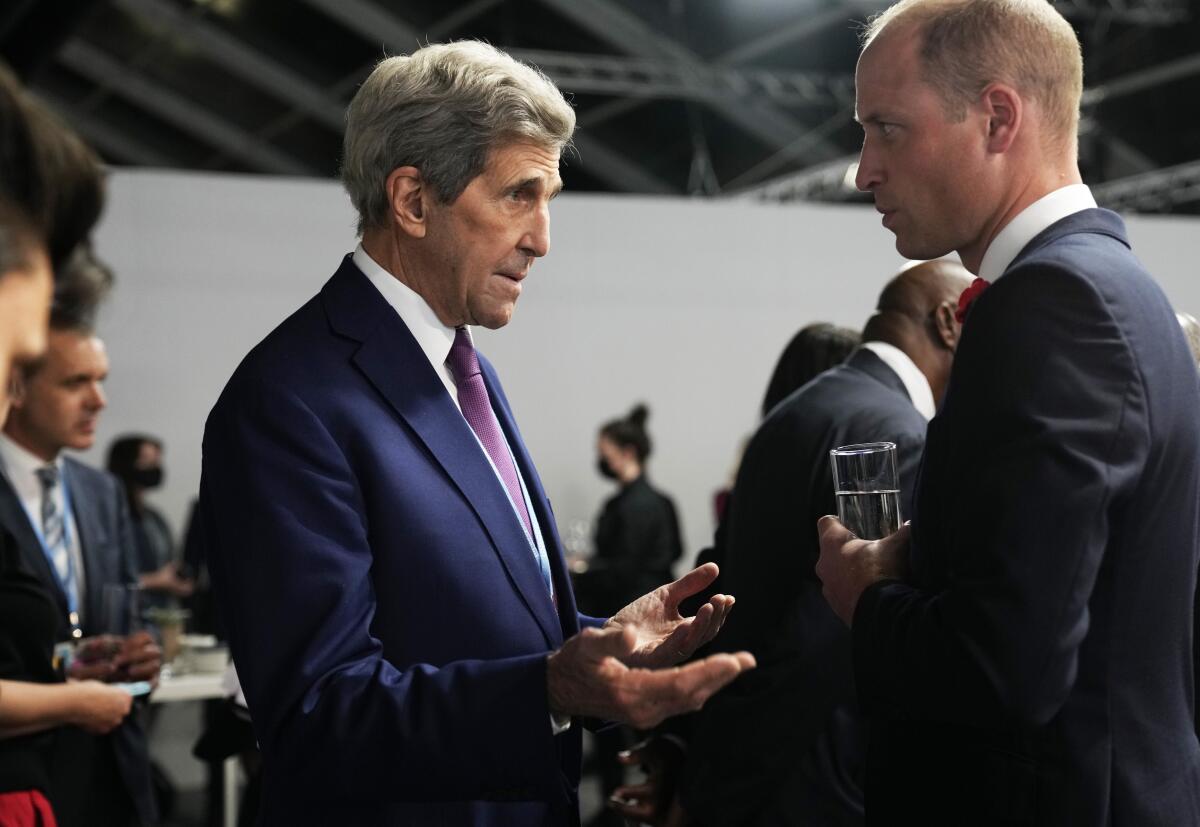
As one of the world’s biggest banks, JPMorgan is also a leading financier of green projects, and has set a target of investing $1 trillion in these over the next decade. However, it made about
$985 million in revenue from fossil fuels compared with $310 million from green projects since the Paris climate agreement in 2015, about three times more, according to Bloomberg Data.
Compared with some other charities, the Royal Foundation’s investments are small, with little impact on climate change. But they are not in line with the ethos of the foundation, which lists conservation and mental health as main points of emphasis, or Prince William’s public statements. His Earthshot Prize, a “global search for solutions to save our planet,” awards grants of up 1 million pounds — about $1.2 million — each year to projects confronting environmental challenges, according to the charity’s website, which suggests banks as among potential recipients.
In July, the Royal Foundation announced that the Earthshot Prize had become an independent charity and Prince William would be its president.
Through launching and awarding the prize and in other public appearances, Prince William has been outspoken on the environment for years. He has argued that entrepreneurs should focus their energies on saving the Earth before investing in space tourism, encouraged parents to consider how their children don’t have the same outdoor opportunities they had and urged conservation.
Toward a more sustainable California
Get Boiling Point, our newsletter exploring climate change, energy and the environment, and become part of the conversation — and the solution.
You may occasionally receive promotional content from the Los Angeles Times.
“Today, in 2022, as the queen celebrates her Platinum Jubilee, the pressing need to protect and restore our planet has never been more urgent,” the prince said in June during Queen Elizabeth II’s Platinum Jubilee.
The policies of the Royal Foundation do not allow ownership of stock in oil companies, tobacco or alcohol. But profits from the Royal Foundation’s account could enable JPMorgan to lend more money to the many oil companies it backs, allowing their expansion. In the same way, investing in companies tied to problems with palm oil supply could help fund unsustainable practices.
While the Cazenove fund is marketed as “sustainable,” as of May 31 the fund held almost $6 million of shares in Nestlé, and shares worth $8.1 million in Reckitt Benckiser, according to Morningstar Direct data. Both Nestlé and Reckitt Benckiser have faced controversy over their palm oil supply. Clearing rainforests to make way for palm oil plantations is one of Southeast Asia’s biggest drivers of deforestation.
Nestlé is the world’s largest food and beverage manufacturer, while Reckitt makes popular U.S. brands, including Lysol and Woolite, and ones familiar in Britain, such as Vanish and Dettol.
Marine heat waves in the Mediterranean Sea, whose water temperatures have been steadily climbing, have prompted dire warnings about marine species.
A 2021 investigation by the environmental NGO Global Witness said both companies were sourcing palm oil via intermediaries from illegally deforested areas in Papua New Guinea. The plantations responsible were also accused of corruption, use of child labor and paying police to attack protesters.
Lily Tomson of the responsible investment charity ShareAction said Cazenove had shown some leadership on sustainable investing, but there “remain areas charities such as the Royal Foundation can push them on.”
Investors can vote on key environmental issues in companies where they hold shares — for example, by setting targets to align with the Paris agreement, or on climate lobbying. Yet Cazenove’s parent company, Schroders, voted against 22% of environmental resolutions last year, Share-
Action research has found.
Kate Rogers, head of sustainability at Cazenove Capital, said the company engaged with Nestlé and Reckitt, and has seen progress on deforestation.
Summer has brought severe drought to the northeastern U.S., which has farmers begging for rain and many communities limiting nonessential water use.
Raj Thamotheram, former head of responsible investing at a $109-billion British university pension fund and AXA Investment Managers, said foundations should be better regulated, with annual reports made to detail how well their investment strategy aligns with their mission.
Thamotheram, now an independent advisor, called unsustainable investments a “cultural and governance blind spot of huge proportions,” and said they were endemic in the charity sector.
“It’s the status quo approach, and it needs shaking up,” he said.
More to Read
Sign up for Essential California
The most important California stories and recommendations in your inbox every morning.
You may occasionally receive promotional content from the Los Angeles Times.
